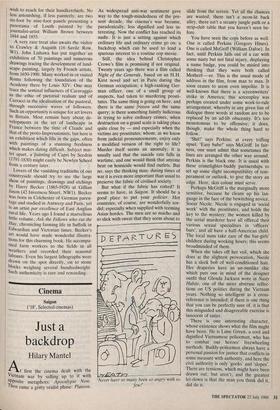Cinema
Saigon (`18', Selected cinemas)
Just a backdrop
Hilary Mantel
A. t first the cinema dealt with the Vietnam war by sidling up to it with aPposite metaphors: Apocalypse Now. Then came a gritty realist phase: Platoon. As widespread anti-war sentiment gave way to the tough-mindedness of the pre- sent decade, the cinema's war became, paradoxically, less dignified and less in- teresting. Now the conflict has reached its nadir. It is just a setting against which ordinary life and ordinary crime go on: a backdrop which can be used to lend a spurious interest to a routine cop movie.
Still, the idea behind Christopher Crowe's film is promising if not original. Twenty years ago there was a film called Night of the Generals, based on an H.H. Kirst novel and set in Paris during the German occupation; a high-ranking Ger- man officer, one of a small group of suspects, had taken to murdering prosti- tutes. The same thing is going on here, and there is the same frisson and the same query; is there something faintly ludicrous in trying to solve ordinary crimes, when destruction on a grand scale is taking place quite close by — and especially when the victims are prostitutes, whom, as we know from judicial pronouncements, enjoy only a modified version of the right to life? Murder itself seems an anomaly; it is usually said that the suicide rate falls in wartime, and one would think that anyone bent on homicide would find outlets. But no, says the thinking man: during times of war it is even more important than usual to preserve the fabric of civilised society. But what if the fabric has rotted? It seems to have, in Saigon. It should be a good place to put your policier. Hot countries, of course, are wonderfully sor- did; especially when supplied with teeming Asian hordes. The men are so macho and so slick with sweat that they seem about to Never have so many been so angry with so few!' slide from the screen. Yet all the chances are wasted; there isn't a neon-lit back alley, there isn't a steamy jungle path or a strip-club table that you haven't seen be- fore.
You have seen the cops before as well. One is called Perkins (Gregory Hines). One is called McGriff (William Dafoe). In fact, until Perkins falls out of a car with some nasty but not fatal injury, displaying a name badge, you could be misled into thinking that they were both called Motherf—er. This is the usual mode of address in the film, from man to man. It soon ceases to seem even impolite. It is well-known that there is a screenwriters' strike in America; this screenplay was perhaps created under some work-to-rule arrangement, whereby in any given line of dialogue three words at random are to be replaced by an ad-lib obscenity. It's too monotonous to be offensive; it does, though, make the whole thing hard to follow.
`Shit!' says Perkins: at every trifling upset. 'Easy babe!' says McGriff. In fair- ness, one must admit that sometimes the lines are arranged the other way around. Perkins is the black one. It is usual with these crimefighter-buddy partnerships to set up some slight incompatibility of tem- perament or outlook, to give the story an edge. Here, skin colour must serve.
Perhaps McGriff is the marginally more sensitive, because he cleans up his lan- guage in the face of the bewitching novice, Soeur Nicole. Nicole is engaged in 'social work' with the prostitutes, and holds the key to the mystery; the women killed by the serial murderer have all offered their various sexual specialities in 'officers' bars', and all have a half-American child. The local nuns take care of the bar-girls' children during working hours; this seems broadminded of them.
When she takes off her veil, which she does at the slightest provocation, Nicole has a sleek bob of well-conditioned hair. Her draperies have an un-nunlike chic which puts one in mind of the designer outfit that Glenda Jackson wore in Nasty Habits, one of the more abstruse reflec- tions on US politics during the Vietnam years. Nothing so intelligent as a cross- reference is intended; if there is one thing that you can be perfectly sure of, it is that this misguided and disagreeable exercise is innocent of satire.
There is one interesting character, whose existence shows what the film might have been. He is Lime Green, a cool and dignified Vietnamese policeman, who has to combat our heroes' freewheeling methods. Buddy-policemen always have a personal passion for justice that conflicts in some measure with authority, and here the civil authority is only 'gooks' and `slopes'. There are tensions, which might have been drawn out, but aren't; and the greatest let-down is that the man you think did it, did do it.














































 Previous page
Previous page